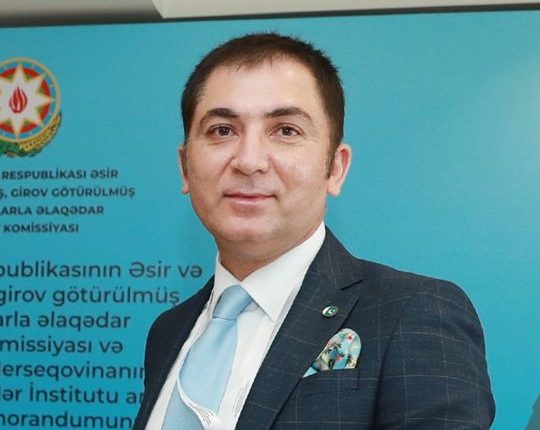Muhammad Sohail Sajid
“Uniting Efforts and Enhancing Cooperation for Addressing the Issue of Missing Persons” are the most important thoughts to resonates with great urgency and moral purpose. Around the world, thousands continue to go missing in armed conflicts and crises, leaving families trapped in uncertainty and grief. It is clear that no nation, no institution, and no organization can face this humanitarian challenge alone. Our strength lies in unity, in working together beyond borders and politics to restore dignity to those who are missing.
The phenomenon of missing persons is in conflict to various declarations of Human Rights. The deprivation of families may indoctrinate in a manner that develop and exhibit stubbornness in expressing utmost revulsion and hatred against the power bug. The states should own their status as a redeemer to pacify and remedy the miseries of not only the missing persons but also of their kith and kin to solace them. The grief with pain, dreadful growl and rumble of the dumb founded must reach the ears of the responsible. We should dumb founded must reach the ears of the responsible. We should stand to advance the democratic and liberal approaches for human rights rather to jetuson or dump them to make the missing as faceless or nameless.
Azerbaijan, having faced this tragedy firsthand, continues to lead by example. During and after the conflict, thousands of Azerbaijanis went missing, many still unaccounted for. Yet, rather than surrendering to despair, Azerbaijan transformed its pain into purpose, spearheading international resolutions on missing persons at the United Nations since 2002, and championing the OIC’s resolution in 2024 whereas the recent held Baku Dialogues stands as a powerful expression of that leadership.
Pakistan proudly stands with Azerbaijan in this shared humanitarian mission. We recognize the importance of solidarity and joint action in uncovering the truth and supporting families who wait for answers. Pakistan remains committed to the principles of international humanitarian and human rights law and actively cooperates with global mechanisms, including the UN Working Group on Enforced and Involuntary Disappearances (WGEID).
The missing persons although hardly reappear which causes hurdles in alienation, letter of administration, inheritance and probate letter of guardianship. The diabolical recurrence resulting in a terrible square in the minds of people that their lives and liberties are under a new peril when the guardians of law gore human rights to death. This phenomenon takes the vulnerability of Human Rights to assume a traumatic and torture-some angle, which is disastrous to awareness and humanist constitutional order.
But, our focus of the nations must move beyond acknowledging the pain, they must work together to prevent it. True progress requires synchronization between nations, coordination between institutions, and trust between communities. The nations must weave a network of cooperation that no obstacle can break.
Allow me to share a few pathways that can bring our efforts closer and make our cooperation stronger:
First, it is imperative that we institutionalize a Global Mechanism for Strategic Convergence, one that harmonizes national and regional initiatives on documentation, tracing, and data exchange. The era of compartmentalized efforts must evolve into one of synchronized governance where humanitarian action operates within a shared architecture of responsibility.
Second, the creation of a Unified Digital Repository on Missing Persons, administered jointly by the United Nations and the International Committee of the Red Cross, can revolutionize the process of identification. By integrating forensic science and next-generation digital tracing technologies, such a system can transform the precision and transparency of global response efforts.
Third, the international community must advance Regional Synergy Platforms within multilateral frameworks such as the OIC, SAARC, and other regional cooperation mechanisms, to institutionalize collaboration among states. Through cross-border forensic missions, joint investigations, and systematic knowledge-sharing, these platforms can convert regional proximity into operational strength.
Fourth, enduring progress depends upon a sustained investment in Institutional Capacity and Cognitive Exchange. This entails equipping investigators, empowering local agencies, and cultivating a transnational culture of trust and competence so that every nation, regardless of capacity, becomes an active participant in such efforts.
Fifth, the frameworks of these nations must remain human-centered and justice-driven. Families of the missing must not merely be subjects of sympathy but beneficiaries of structured psychosocial, legal, and economic support. True multilateral cooperation is measured not by policies drafted but by lives restored, grief acknowledged, and dignity upheld.
A collective challenge for the nations is to turn this empathy into something tangible. Cooperation must become more than a word, it must be a system that delivers results. When we share technology, expertise, and data, we move closer to truth. When we share compassion, we move closer to peace.
Azerbaijan’s continued leadership in convening these conferences exemplifies what sustained cooperation can accomplish. But the success of the nations depends on whether they transform dialogue into coordinated action. Every bilateral agreement to exchange information, every regional forensic center established, every family association partnership formed, are the tangible fruits that can bring missing persons home.

